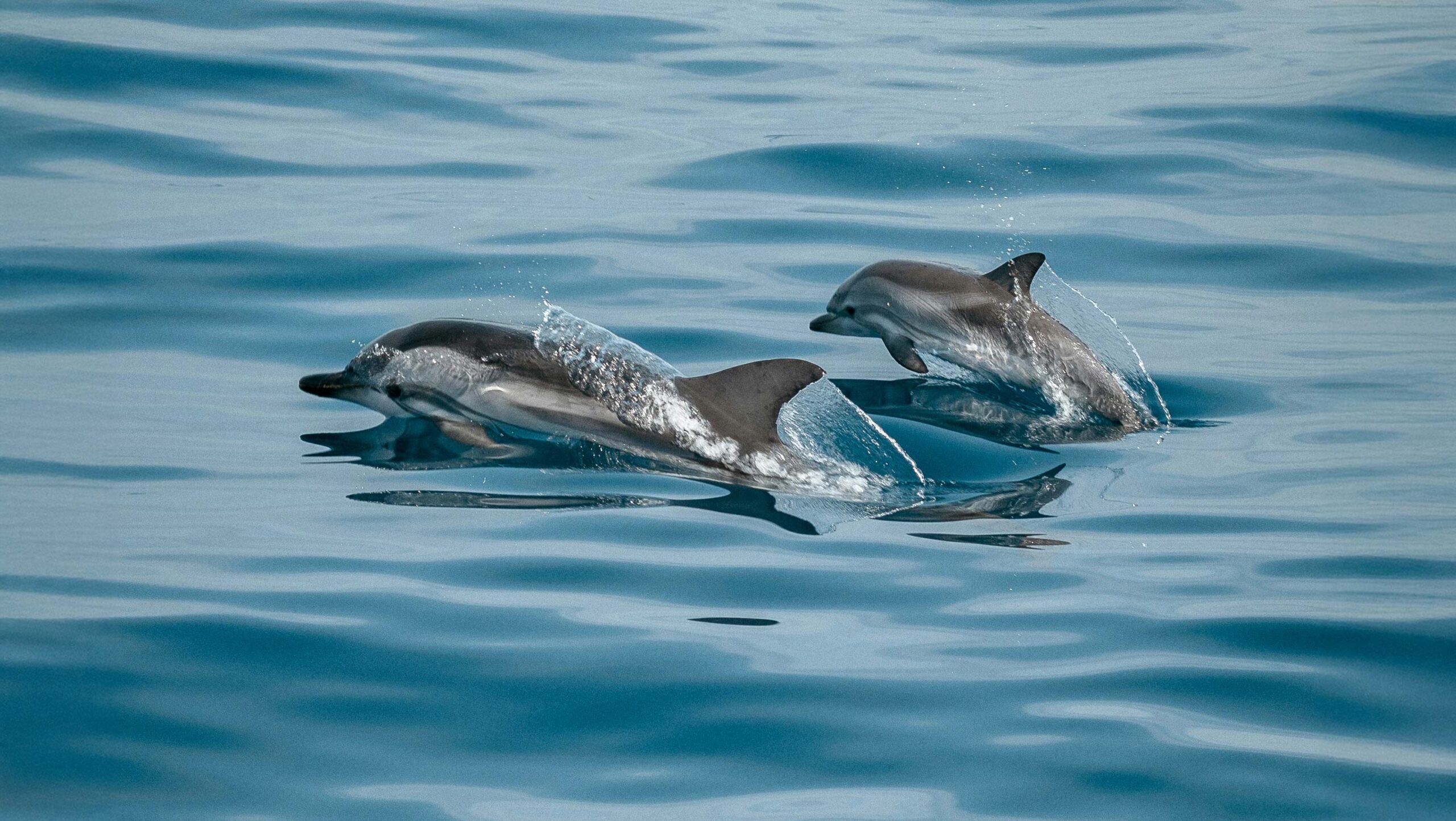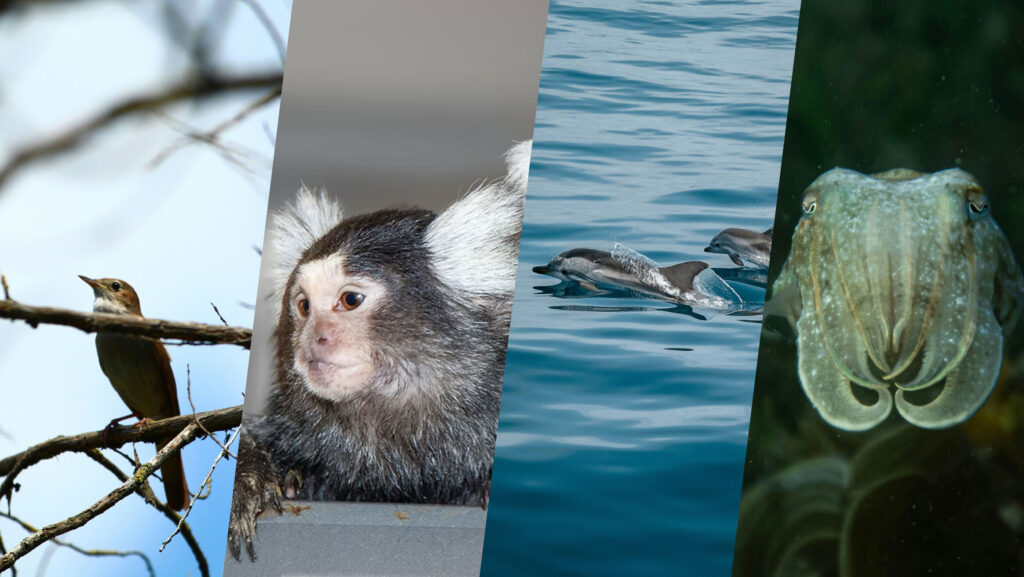Researchers Awarded $100,000 for Identifying First Evidence of Possible Language-like Communication in Dolphins
Press Releases —

- The Coller Dolittle Challenge has revealed the winner of its first USD$100,000 annual prize – accelerating progress towards interspecies two-way communication.
- The winning team of researchers have discovered that dolphin’s non-signature whistles could function like words – with mutually understood, context-specific meaning.
- The next round of applications for the Coller Dolittle Prize is now open until the deadline, 30th August 2025.
London, 17 May 2025: The Jeremy Coller Foundation and Tel Aviv University are today announcing the winner of the inaugural USD$100,000 prize from the Coller Dolittle Challenge for Interspecies Two-Way Communication. This year’s prize has been awarded to a team of US-based researchers who have discovered the first evidence in dolphins of a possible language-like communication system, with shared, context-specific meanings.
Led by Laela Sayigh from the Woods Hole Oceanographic Institution, the winning research team – including Peter Tyack from Woods Hole Oceanographic Institution, Vincent Janik from the University of St. Andrews, Frants Jensen from Aarhus University, Katie McHugh and Randall Wells from Brookfield Zoo Chicago’s Sarasota Dolphin Research Program – has been studying a resident bottlenose dolphin community in Sarasota, Florida. The study focused on non-signature whistles – which comprise approximately 50% of whistles produced by Sarasota dolphins. Non-signature whistles differ from the more widely-studied signature whistles – which are referential, name-like vocalizations.
The winning study identified distinct non-signature whistle types used by multiple dolphins for communication. Using playback experiments performed under completely natural conditions in the wild, the team elicited avoidance responses for one non-signature whistle, suggesting an alarm function. A second non-signature whistle was found to correlate to a query function, produced in response to an unexpected or unfamiliar situation.
Laela’s team have recorded known individual dolphins with non-invasive suction-cup hydrophones placed on the animals during unique catch-and-release health assessments, as well as with digital acoustic tags.
The prize was presented during a virtual event with four shortlisted teams of researchers from the USA, Germany, France and Israel showcasing their remarkable discoveries in communication with monkeys, nightingales and cuttlefish. All four finalists used cutting-edge technology and breath-taking ingenuity to decipher, interface and mimic non-human organism communication.
Laela Sayigh, Woods Hole Oceanographic Institution, said:
“Bottlenose dolphins have long-fascinated animal communication researchers.Without the over five-decade-long study by the Sarasota Dolphin Research Program, we would not have such an extensive library of vocalizations for individual dolphins. With this, we are able to study non-signature whistles, which have received very little research attention to date. Our work shows that these whistles could potentially function like words, shared by multiple dolphins.
“I would like to thank the large team that contributed to this breakthrough, involving the Brookfield Zoo Chicago’s Sarasota Dolphin Research Program, the Woods Hole Oceanographic Institution, the University of St Andrews, and Aarhus University.”
Jeremy Coller said:
“Humans share this planet with millions of other species, but for far too long we’ve only talked amongst ourselves. The Coller Dolittle Challenge aims to change that, so I’m really excited by the fascinating work Laela and her team have done on dolphin communication. They are worthy winners and I can’t wait to see how they use AI to further interpret this vast set of data.”
Professor Yossi Yovel, Tel Aviv University and Chair of the Coller Dolittle Challenge, said:
“All the shortlisted entries truly raised the bar. The winner of this year’s prize stood out not only for its scientific rigour, but for the creative field experiments it has performed. We’re proud to celebrate such impressive work and are looking forward to what’s to come with the next round of submissions. If this year is anything to go by, the future of interspecies communication research is going to be fascinating.”
Jonathan Birch, Professor of Philosophy, London School of Economics & Politics (LSE) and a member of the scientific panel of judges added:
“The main thing stopping us cracking the code of animal communication is a lack of data. Think of the 1 trillion words needed to train a large language model like chatGPT. We don’t have anything like this for other animals. That’s why we need programs like the Sarasota Dolphin Research Program, which has built up an extraordinary library of dolphin whistles over 40 years. The cumulative result of all that work is that Laela Sayigh and her team can now use deep learning to analyse the whistles and perhaps, one day, crack the code.”
Through the challenge, a prize of USD$100,000 will be awarded every year until a team deciphers the secret to interspecies communication. For the successful team that ultimately cracks the code of Interspecies Two -Way Communication, a Grand Prize of either a USD$10million equity investment or a USD$500,000 cash prize will be awarded. The Grand Prize will be awarded when the animal communicates independently without recognizing that it is communicating with humans. The challenge is operated on an open access basis meaning that the data is available to the scientific community for advancement of this field of study.
Submissions for the 2026 prize are now open. As the Challenge progresses, the $100,000 prize will be awarded to the most promising research team each year to support their work in developing scientifically rigorous models and algorithms for coherent communication with non-human animals.
The research must adhere to the following criteria:
- Uses a non-invasive approach to communicate with or decipher an animal’s communication.
- Demonstrates communication in more than one context (e.g., alarm, mating, foraging) using the animal’s endogenous communication signals.
- Demonstrates a measurable response of the animal to the signals broadcasted to it.
The deadline for submissions is 30th August 2025. Full details and guidelines for submission can be found on the website.
Media Contact:
For more information, including interviews and comment, please contact:
- Ino Rousselet, ESG Communications
- +44 (0)7786148010 | ino.rousselet@flag.co.uk
The Coller Dolittle Challenge:
This global initiative will be administered by Tel Aviv University and chaired by Professor Yossi Yovel, a noted scientist in the field. Professor Yovel chairs an expert scientific panel of judges including Professor Inbal Arnon (Professor of Psychology, HUJ), Professor Jonathan Birch (Professor of Philosophy, LSE), Professor Mirjam Knörnschild (Biologist, Frei Uni.), Professor Elodie Floriane Mandel-Briefer (ecologist, University of Copenhagen), Professor Oded Rechavi (Geneticist, TAU) and ProfessorAmir Teicher (History of Science, TAU), among others. The challenge will be operated on an open access basis with data made available to the scientific community for advancement of this field of study.
More information about the challenge can be found here.
About The Coller Foundation
The Jeremy Coller Foundation addresses the consequences of intensive animal agriculture for human health, the environment, animal welfare and global sustainability with the aim of supporting the transition to a more sustainable food system. The Foundation’s flagship initiatives include The FAIRR Initiative (Farm Animal Investment Risk & Return), the fastest growing investor network representing $80 trillion of assets under management, raising awareness of the material risks and opportunities around intensive animal agriculture; the Coller Animal Law Forum (CALF), which aims to accelerate law and policy globally in this area; and The Jeremy Coller Centre for Animal Sentience at the London School of Economics and Political Science (LSE). The Jeremy Coller Foundation also supports a number of initiatives in business and venture education and pensions innovation worldwide.
Further Reading
